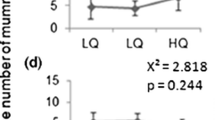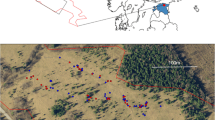Abstract
Motivation-based models dominate current theory concerning host plant selection for oviposition by herbivorous insects. A female searching for a host plant will be more likely to accept a host which is of inferior quality for her offspring if motivation is high, e.g. a large eggload or long time since last oviposition. This implies that insects will accumulate eggs if exposed to hosts of low acceptability and after a time lay eggs on such hosts. An alternative strategy for insects when exposed to less acceptable hosts is to stop producing, instead of accumulating, eggs. Thus, resources would be saved until a more acceptable host is found. If this hypothesis is true, a herbivorous insect would cease egg production when exposed to hosts of low acceptability and resume egg production when exposed to hosts of high acceptability. Previous exposure should not affect oviposition rate when an insect encounters a new host of a different quality. In an earlier study pollen beetles, Meligethes aeneus (F.) (Coleoptera: Nitidulidae), did not accumulate eggs in the absence of high quality hosts. In this study we monitored the daily oviposition rate of female pollen beetles on hosts plants of low (Sinapis alba L.), intermediate (Brassica nigra Koch) or high (B. napus L.) acceptability over a 5-day period. Individuals were then switched to an oviposition resource of a different acceptability. Beetles moved from high- to low-acceptability plants reduced their oviposition rate considerably. In the opposite case, low to high acceptability, the rate of oviposition increased markedly after the switch. When M. aeneus were moved from the high-acceptability host to that of intermediate acceptability oviposition rate was modified accordingly. However, when moved to the intermediate host from a host of low acceptability oviposition on B. nigra was much less than would normally be expected. A possible mechanism for this finding is discussed. M. aeneus, by adjusting oviposition rate to host acceptability, maximizes the average host quality for offspring, even at the cost of a lower egg-laying rate.
Similar content being viewed by others
Author information
Authors and Affiliations
Additional information
Received: 5 October 1998 / Accepted: 20 April 1999
Rights and permissions
About this article
Cite this article
Hopkins, R., Ekbom, B. The pollen beetle, Meligethes aeneus, changes egg production rate to match host quality. Oecologia 120, 274–278 (1999). https://doi.org/10.1007/PL00008823
Issue Date:
DOI: https://doi.org/10.1007/PL00008823




